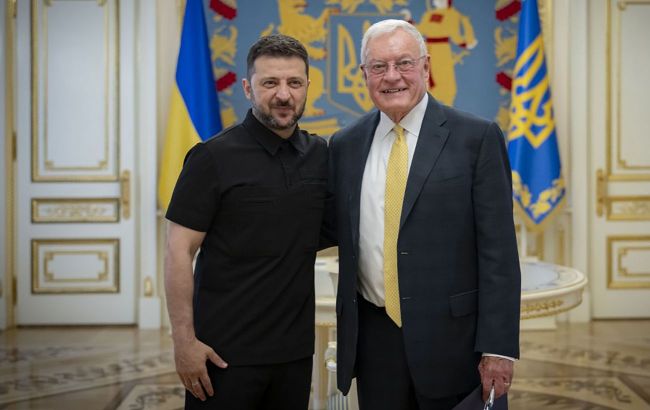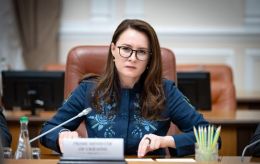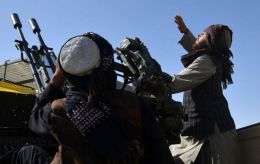Russia attacks Poland, Kellogg visits Kyiv: What this week means for Ukraine peace talks
 Volodymyr Zelenskyy and Kit Kellogg (photo: Getty Images)
Volodymyr Zelenskyy and Kit Kellogg (photo: Getty Images)
While Donald Trump put his peacekeeping efforts on pause (except for another visit by Keith Kellogg to Kyiv), Russia for the first time deliberately attacked Poland, and just two days later, together with Belarus, began saber-rattling at the Zapad-2025 exercises.
RBC-Ukraine explains how these events have affected the negotiation process.
Key questions:
- What is the impact of Russia’s strike on Poland on the negotiations?
- What did Trump say about the negotiations?
- What did Zelenskyy and Kellogg discuss in Kyiv?
Strike on Poland
Russia continues massive missile-and-drone strikes on Ukrainian territory. Moreover, on the night of September 10, 19 Russian drones entered Polish territory.
Prime Minister Donald Tusk initially called the attack a “massive provocation.” Later, at Poland’s request, Article 4 of the North Atlantic Treaty was invoked, which provides for consultations among NATO members.
President of Ukraine Volodymyr Zelenskyy said that Kyiv is ready to assist Poland in building an alert and air defense system. Ukraine and Poland agreed to train Polish military personnel in repelling drone attacks.
The US leadership reacted very cautiously to the events. US President Donald Trump first fled from journalists who tried to ask him about it, then suggested that the Russian drones might have entered Poland accidentally. And finally, he stated that the Russian president should not be close to Poland, but when asked about defending the ally, he responded negatively.
“I'm not going to defend anybody. They (drones - ed.) were actually knocked down. But he shouldn't be close to Poland anyway,” Trump briefly replied to reporters’ questions.
US Ambassador to NATO Matthew Whitaker declared solidarity with Poland but did not specify what steps the US planned to take.
“We stand by our NATO Allies in the face of these airspace violations and will defend every inch of NATO territory,” Whitaker emphasized.
European NATO members reacted more decisively. France, Germany, and the United Kingdom will strengthen their military presence in Poland. They are about to increase the number of aircraft patrolling the skies.
In the context of negotiations, this incident showed that Russia, instead of reducing tensions, is raising the stakes and escalating the war.
US – treading water
Amid events in Poland, the organization of a possible meeting with Trump, Zelenskyy, and Putin has moved to the background. Even at the level of statements, there is no visible progress in this direction.
At the beginning of the week, Trump stated that he would speak with Putin in the near future. However, throughout the week, no news of their conversation appeared.
US Vice President JD Vance said that they have now managed to narrow down the issues to just a few key ones.
“One of the issues is territorial. The Russians want about 6,000 square kilometers that they have not yet conquered through military force. That's what the Russians want. The Ukrainians, on the flip side, want security guarantees, whether from Europeans or somebody else,” Vance explained.
According to the politician, the Trump administration does not seek economic isolation of Russia, as allegedly this would complicate achieving peace in Ukraine.
On May 12, Trump was asked whether he was running out of patience with Russian president Vladimir Putin.
“Yeah, it's sort of running out, and running out fast, but it does take two to tango. It’s amazing. When Putin wants to do it, Zelenskyy didn’t. When Zelenskyy wanted to do it, Putin didn’t,” Trump said.
In his view, now Zelenskyy wants peace, but Putin is questionable. And therefore, the US will have to act “very hard.” However, Trump once again announced neither the timing nor the content of these actions.
Trips of special envoys
On Monday, EU special envoy David O’Sullivan arrived in Washington. He discussed with Trump’s team a new package of sanctions against Russia.
According to the Financial Times, EU officials are discussing potential sanctions against China and other third countries for purchasing Russian oil and gas. However, the EU’s proposals on secondary sanctions are at a very early stage. And the likelihood of their introduction will depend on the position of the US and its readiness to confront the import of Russian energy resources by China.
Meanwhile, US special envoy for Ukraine Keith Kellogg arrived in Kyiv. President Zelenskyy met him and discussed projects within the PURL initiative (purchasing American weapons at the expense of European countries) and the financing and purchase of Patriot systems.
The parties also discussed pressure on Russia and tariff-sanctions policy, to still hold a leaders’ meeting as soon as possible.
***
Back in the spring of this year, US President Donald Trump stated that in case of no progress in the negotiations, he would withdraw from the process. Although this is not formally mentioned now, the passivity of Trump’s team may be a sign that this very scenario will be implemented.
Even Russia itself speaks of a de facto freezing of negotiations. Putin’s spokesman Dmitry Peskov stated that now “one can speak of a pause in negotiations between Russia and Ukraine, although communication channels of the negotiating groups remain open.”
EU High Representative Kaja Kallas believes that the war in Ukraine will last at least another two years. In her assessment, the war has reached a deadlock, and Russia is only gaining boldness.

